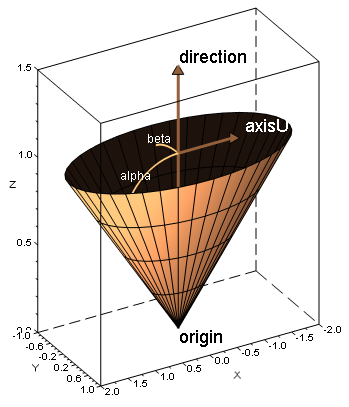User Manual 4.0 Infinite elliptic cone
Definition
An infinite elliptic cone is a ruled surface that resembles a cone except that its basis is an ellipse. As such, it is also a set of half-lines that start at the common point called apex and describe, in a plan perpendicular to the axis of the cone, an ellipse. It's equation is given hereunder :
Implementation
The InfiniteEllipticCone object in the SIRIUS library implements the InfiniteCone Interface. Please refer to the Javadoc for a complete list of public methods.
Instantiation
In order to instantiate an infinite elliptic cone object, the user must specify the cones' "center", its main axis, its axis along which aperture is [math]2*a[/math] and both angles. For example :
// Cones parameters Vector3D position = new Vector3D(1, 2, 3); Vector3D axis = new Vector3D(0, 1, 1); Vector3D axisU = new Vector3D(2,-1, 0); double alpha = Math.PI / 8; double beta = Math.PI / 10; // The cone itself InfiniteEllipticCone myCone = new InfiniteEllipticCone(position, axis, axisU, alpha, beta);
Usage
Please refer to the [MAT_GEO_Home#HInteractions Interactions with other geometrical objects section] for methods inherited from the Shape interface.
